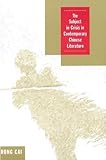The Subject in Crisis in Contemporary Chinese Literature / Rong Cai.
Material type: TextPublisher: Honolulu : University of Hawaii Press, [2004]Copyright date: ©2004Description: 1 online resource (296 p.)Content type:
TextPublisher: Honolulu : University of Hawaii Press, [2004]Copyright date: ©2004Description: 1 online resource (296 p.)Content type: - 9780824827618
- 9780824865061
- 895.1/35209
- PL2262 ǂb C25 2004eb
- online - DeGruyter
- Issued also in print.
| Item type | Current library | Call number | URL | Status | Notes | Barcode | |
|---|---|---|---|---|---|---|---|
 eBook
eBook
|
Biblioteca "Angelicum" Pont. Univ. S.Tommaso d'Aquino Nuvola online | online - DeGruyter (Browse shelf(Opens below)) | Online access | Not for loan (Accesso limitato) | Accesso per gli utenti autorizzati / Access for authorized users | (dgr)9780824865061 |
Browsing Biblioteca "Angelicum" Pont. Univ. S.Tommaso d'Aquino shelves, Shelving location: Nuvola online Close shelf browser (Hides shelf browser)

|

|

|

|

|

|

|
||
| online - DeGruyter The Shishu Ladies of Hilo : Japanese Embroidery in Hawai`i / | online - DeGruyter The Spectacle of Japanese American Trauma : Racial Performativity and World War II / | online - DeGruyter The Structure of Detachment : The Aesthetic Vision of Kuki Shuzo / | online - DeGruyter The Subject in Crisis in Contemporary Chinese Literature / | online - DeGruyter The Tay Son Uprising : Society and Rebellion in Eighteenth-Century Vietnam / | online - DeGruyter The Teeth and Claws of the Buddha : Monastic Warriors and Sohei in Japanese History / | online - DeGruyter The Thought War : Japanese Imperial Propaganda / |
Frontmatter -- Contents -- Preface -- 1. Introduction -- 2. In Search Of A New Subject -- 3. The Spoken Subject Han Shaogong'S Cripples -- 4. In The Madding Crowd 92 Self And Other In Can Xue'S Fiction -- 5. The Post-Mao Traveler On The New Long March -- 6. Mirror Of The Self The Foreign Other In Mo Yan'S Large Breasts And Full Hips -- 7. Appropriation And Representation The Intellectual Self In The Early 1990S -- Epilogue -- Notes -- Bibliography -- Index
restricted access online access with authorization star
http://purl.org/coar/access_right/c_16ec
Post-Mao China produced two parallel discourses on the human subject in the New Era (1976-1989). One was an autonomous, Enlightenment humanist self aimed at replacing the revolutionary paragon that had dominated under Mao. The other was a more problematic subject suffering from either a symbolic physical deformity or some kind of spiritual paralysis that undermines its apparent normalcy. How do we explain the stubborn presence, in the literature of the 1980s and 1990s, of this crippled agent who fails to realize the humanist autonomy envisioned by post-Mao theorists? What are the anxieties and tensions embedded in this incongruity and what do they reveal?This illuminating and original critical study of the crippled subject in post-Mao literature offers a detailed textual analysis of the work of five well-known contemporary writers: Han Shaogong, Can Xue, Yu Hua, Mo Yan, and Jia Pingwa. The author investigates not only the literary characters within the texts, but also their creators-real subjects in history, Chinese writers whose own agency was being tested and established in the search for a new subjectivity. She argues that, reenacting the Maoist legacy, the literary search failed to provide a viable model for a postrevolutionary China. In addition, the deficiency and inadequacy of the subject cannot always be contained in the Communist past-a history to be transcended in the design of modernity after Mao. The representation of the problematic subject thus punctured post-Mao optimism and foreshadowed the eventual abandonment of the move to rethink subjectivity in the 1990s. By diving beneath the euphoria of the 1980s and the confusion and frustration of the 1990s, these critical readings offer a unique perspective with which to gauge the complexity of China's quest for modernity and a fuller understanding of the self's multifaceted experience in the post-Mao era.
Issued also in print.
Mode of access: Internet via World Wide Web.
In English.
Description based on online resource; title from PDF title page (publisher's Web site, viewed 02. Mrz 2022)


